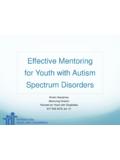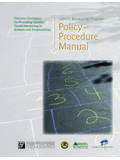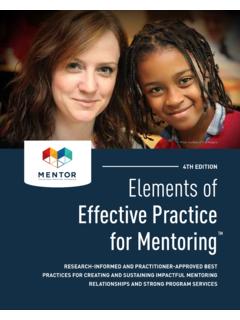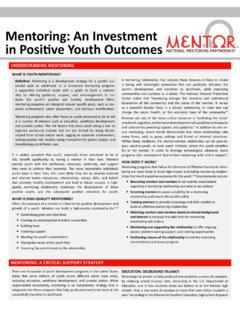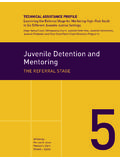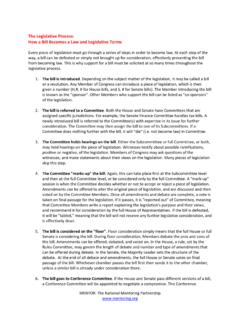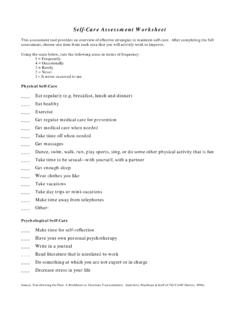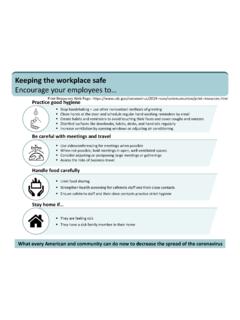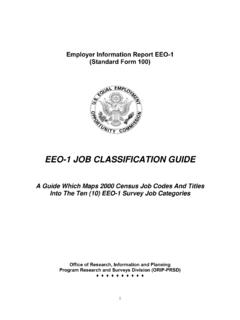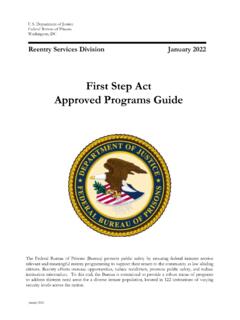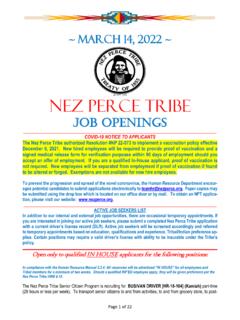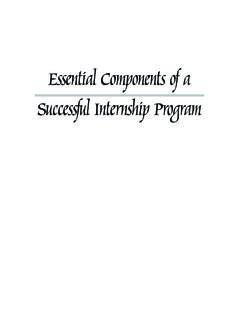Transcription of School Checklist for Developing and Launching a Success ...
1 School Checklist for Developing and Launching a Success Mentors Program Use this Checklist to ensure that you are designing and Launching your Success Mentors Program in alignment with evidence-based practice for mentoring. Use the icons to the left to identify where your program can utilize MENTOR: The National Mentoring Partnership and its local affiliates, as well as no-cost resources available at Where Should I Start? The ABC's of School -Based Mentoring provides a guide to all aspects of designing and delivering a School - based mentoring program. This Template Mentoring Program Policy and Procedure Manual provides examples of many of the policies and procedures we suggest in the below Checklist . Be sure to read through the Elements of Effective Practice for Mentoring TM, which details research- informed and practitioner-approved Standards for creating and sustaining quality youth mentoring programs.
2 For programs serving the elementary grades, read through the draft Relationships Matter: Elementary Success Mentors Toolkit from Attendance Works. In it, you'll find the Elementary Success Mentor Planning Tool, a worksheet to help you get started, implement and assess the impact on attendance from your program, as well as a sample job description for a Success Mentors site coordinator . Recruitment and Screening Refer to the Elements of Effective Practice for Mentoring TM for guidance on recruitment and screening for mentors and mentees. Recruiting Mentees Identify chronically absent students in need of a mentoring intervention. Develop a written statement outlining eligibility requirements and expectations for students involved in the Success Mentors Program. Develop materials for parents, caregivers and families explaining the benefits of mentoring and how they can support their student in his or her mentoring relationship.
3 Develop a strategy for documenting informed permission from parents/caregivers for students to be involved with the program, and communicating the goals and expectations of the program to parents/caregivers as well as students themselves. Check out Attendance Works' Elementary Success Mentor Toolkit for Parent FAQs and a sample parent letter for participating students. Recruiting Internal Mentors Clearly communicate the expectations and role of internal School staff who volunteer as mentors, as well as how volunteering to be a mentor can benefit them. Acknowledge that many teachers and School staff are already informal mentors, and that volunteering as a Success Mentor provides School staff with an opportunity to recognize their efforts and provide additional training and support.
4 Develop and share a written statement outlining eligibility requirements for mentors. Develop a communication (email, flyer, newsletter piece, staff meeting announcement, etc.) and provide information to internal mentors about how they can sign up to be mentors. Check out the Recruitment section of Relationships Matter: Elementary Success Mentors Toolkit for a sample volunteer role description and recruitment letter. Set up a group presentation for all interested parties and walk them through the role and expectations of them as a mentor for this program. Let them know how much of a time commitment the program will be and what the requirements will be with regard to training and checking in with a supervisor or mentoring coordinator at School . Screening Internal Mentors Develop eligibility criteria for mentors, as well as criteria that would disqualify a mentor from participating in the program.
5 Reach out to your Mentoring Partnership/TA Provider to ensure that you have a strategy that helps you assess prospective mentors' attitudes and beliefs that support safe and effective mentoring relationships (even for internal mentors!). Meet with each participant individually to assess their interest in mentoring, understanding of expectations, and appropriateness for this role. Schedule and facilitate a mentor onboarding session, covering expectations and how to get started. Address the role of a mentor, review common challenges, and let mentors know how they can get support if they need help. Reach out to your Mentoring Partnership/TA Provider for help with this important part of the process. Recruiting & Screening External Mentors Partnerships with organizations in your community may provide a source of external mentors.
6 Reach out to the MENTOR affiliate in your area to identify community partners who may be good sources of volunteer mentors. Meet with partners to discuss the needs of your students and the availability/suitability of their volunteer pool, as well as the frequency that they will be able to meet with mentees in the School environment. Remember that frequent interactions with mentors in School is at the heart of the Success Mentors model, and be sure that the frequency/availability of mentors (how many times per week they can meet with students) matches up with your students' needs. Discuss their recruitment, screening, and training guidelines and ensure that they align with those of your School , including background checks/fingerprinting protocols. Develop a process for recruiting, screening, onboarding, and providing ongoing support to these mentors in partnership with the community organization.
7 O Remember that all mentors should be screened using national, fingerprint-based FBI criminal background checks. o Reach out to your Mentoring Partnership/TA Provider to ensure that you are using evidence-based screening practices to identify individuals who have attitudes and beliefs that support safe and effective mentoring relationships. In considering potential community partners and sources of volunteers, consider these questions: o What external sources exist in your community that you already have access to? o What external sources exist in your community that need to be cultivated (and what are the barriers to this). Utilize online toolkits to help you create effective mentor recruitment messaging and materials, including the Men in Mentoring Toolkit and Effective Mentor Recruitment: Getting Organized, Getting Results.
8 Reach out to your Mentoring Partnership/TA Provider for assistance in Developing a recruitment plan. Working with Peer Mentors If you are considering a peer mentoring model at your School , be sure to design a program that builds in lots of support for all the students engaged in the program, and consider Developing a structured curriculum of activities that supports the development of peer relationships, as well as the personal development of all participants. Check out this Peer Mentoring Handbook for materials that may be helpful for peer mentors and tips for supporting peer mentors effectively, and familiarize yourself with the work and resources of Center for Supportive Schools, a leader in best practices for peer mentoring. Mentor Training Refer to the Elements of Effective Practice for Mentoring TM for guidance on Developing effective mentor trainings.
9 Develop and deliver an initial training session for mentors (external or internal). o Your Mentoring Partnership/TA Provider can assist you in Developing a training curriculum that best meets the needs of your specific group of mentors. For internal mentors, avoid redundant youth development topics that they are already aware of as School professionals, and focus on the most relevant challenges and issues they will face, including maintaining their role and appropriate boundaries as mentors. o In this training, review the purpose of mentoring, program requirements (length of relationship, frequency of contact, and how the relationship will eventually end) as well as mentees' goals, ethics and safety, and effective/healthy closure for the relationship. o Be sure to clearly communicate the limitations of the mentor role, how mentors and mentees should and should not contact one another, and how to maintain healthy boundaries in mentoring relationships.
10 Be sure that mentors are aware that they should elevate any serious or safety-related issues they become aware of in a mentee's life to the School administration for an appropriate response. o Utilize free training curricula available on the National Mentoring Resource Center website, including Ongoing Training for Mentors: Twelve Interactive Sessions for Department of Education Mentoring Programs and Talking it Through: Communication Skills for Mentors. Develop a plan and schedule for providing ongoing training to mentors around special topics of interest or to respond to common needs (one or more ongoing training opportunity per year is recommended). Determine whether your program will be enhanced by parent training or other parent engagement techniques. Explore this with your Mentoring Partnership/TA Provider.

